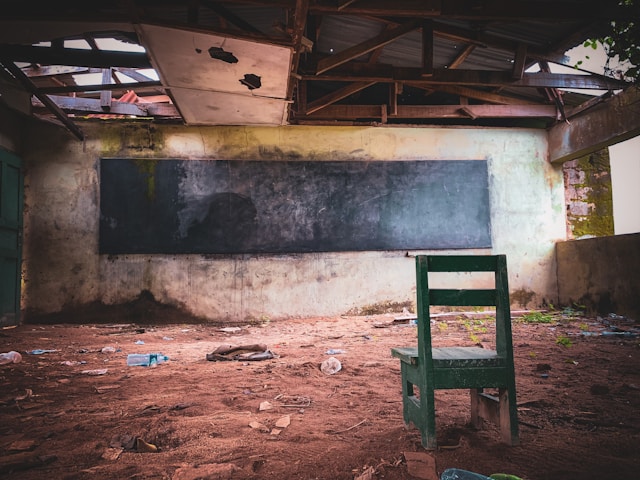Challenges Facing Public Schools in Nigeria
Public schools in Nigeria were once a source of pride, offering affordable and quality education to millions of children. Today, many of those schools stand as a shadow of what they used to be. Peeling paint, overcrowded classrooms, dilapidated buildings, and a shortage of teachers have become the norm rather than the exception. The decline of public schools is not just an educational issue — it’s a crisis that affects the future of an entire nation.
In this article, we explore the biggest challenges facing public schools in Nigeria and why urgent solutions are needed.
Poor Infrastructure
One of the first things visitors notice in many public schools is the poor state of infrastructure. Classrooms have leaking roofs, cracked walls, or no furniture. In rural areas, classes are sometimes held under trees. Students sit on bare floors, writing on their laps because there are no desks.
Lack of proper facilities makes learning uncomfortable and unsafe, especially during the rainy season when classes are disrupted by water flooding into classrooms. Poor sanitation facilities expose students to infections and discourage many, particularly girls, from attending school regularly.
Overcrowding
Nigeria has one of the fastest-growing populations in the world. The number of children needing basic education keeps increasing, but the number of public schools — and classrooms — has not kept pace.
It’s not unusual to see 80 to 100 pupils squeezed into a classroom meant for 30. Teachers struggle to control such large classes, and many students get left behind. Overcrowding means less personal attention, more noise, and a stressful environment that affects both teaching and learning quality.
Shortage of Qualified Teachers
Even when schools exist, many lack qualified teachers. Some teachers have minimal training or are employed as temporary staff with little motivation. Rural schools face the biggest shortages because qualified teachers often refuse to work in remote areas where conditions are harsh and salaries may be delayed.
A classroom without a qualified teacher is like a car without fuel — it goes nowhere. Without committed, trained teachers, students cannot receive the quality education they deserve.
Insufficient Funding
Education is supposed to be free in public schools, but chronic underfunding means parents often pay for items like textbooks, chalk, chairs, cleaning, and exam fees. This hidden cost keeps poor children out of school.
Government budgets for education in Nigeria have remained low for decades, falling short of the UNESCO recommendation of at least 15-20% of the national budget. As a result, schools can’t afford maintenance, new buildings, learning materials, or technology.
Insecurity and Safety Concerns
Sadly, education in parts of Nigeria has become dangerous. Bandit attacks, kidnappings, and insurgencies in some regions have forced many schools to shut down entirely. Parents are afraid to send their children to school, especially girls who are often targeted.
Even in safer areas, theft, vandalism, and lack of proper security leave students and teachers feeling unsafe. When education becomes a risk to life, it’s the nation’s future that is under threat.
Corruption and Mismanagement
Corruption remains a major challenge in the Nigerian education sector. Funds meant for school construction or teacher salaries sometimes disappear into private pockets. Ghost workers (nonexistent staff on payroll) drain resources that could have improved schools.
Until accountability and transparency are enforced, money meant for public schools will continue to be wasted, leaving students in miserable conditions.
Outdated Curriculum and Lack of Technology
Many Nigerian public schools still teach outdated curricula that do not prepare students for modern jobs or global competition. Skills like digital literacy, coding, critical thinking, and entrepreneurship are missing from most classrooms.
Few public schools have computers, internet access, or modern science laboratories. Without exposure to modern tools, Nigerian students risk being left behind in the digital age.
Socio-Economic Challenges
Poverty forces many parents to keep children at home or push them into street hawking, farming, or other jobs to support the family. Girls are often pulled out of school for early marriage, while boys may drop out to work.
Hunger is another challenge. Many children come to school without breakfast and can’t focus on lessons because they’re hungry. A child cannot learn on an empty stomach.
The Way Forward
Despite these challenges, there is hope. Nigerians are resilient and deeply value education. The government, private sector, NGOs, and communities must work together to:
- Increase budgetary allocations to education and ensure proper use of funds.
- Improve infrastructure — build classrooms, toilets, and provide clean water.
- Recruit, train, and retain qualified teachers, especially in rural areas.
- Update curricula to include practical skills and technology.
- Strengthen security around schools.
- Implement school feeding programs to keep children in class.
Conclusion
The challenges facing public schools in Nigeria are serious but not impossible to solve. A nation’s future is built in its classrooms. By investing in public schools, Nigeria invests in its people, economy, and place in the world.
Let’s remember: every child deserves a safe, clean, and well-equipped school where they can dream, learn, and thrive. The time for change is now.
Read here also: How Poor Sanitation is Affecting Students’ Health in Nigerian Schools

